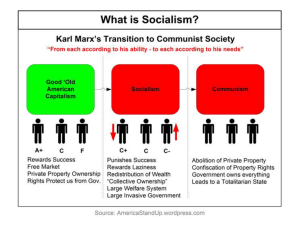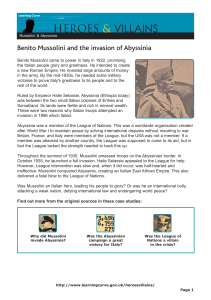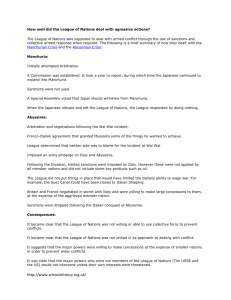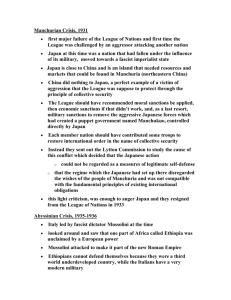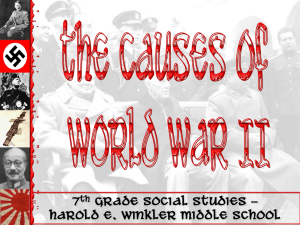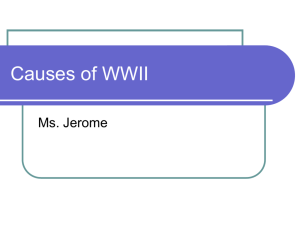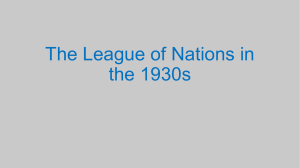001 road to WWII
advertisement
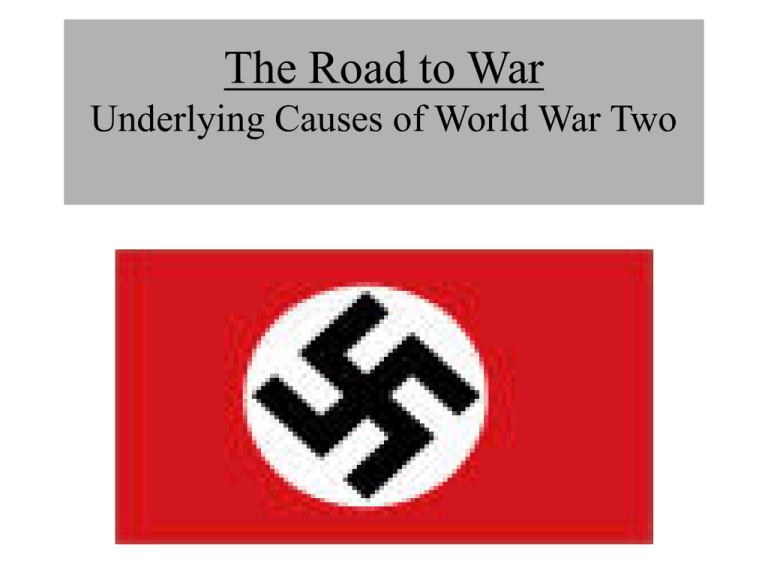
The Road to War Underlying Causes of World War Two 1. The Treaty of Versailles Harsh terms intended to make Germany powerless • accept total blame for WW1 • reduced military • reparations of $33 billion • loss of territory In reality the treaty had the opposite effect. It gave German’s grievances that Hitler would attempt to solve, such as restoring national pride 2. Emergence of New Countries After WW1 After World War One German people were living in new countries such as Poland, Czechoslovakia, and Austria Many Germans felt these countries should “belong” to Germany 3. Rise of Fascism • Facism: “A system of government in which nationalism is promoted, labour and industry are regulated by a strong national government, and all opposition is suppressed March on Rome • The political ideology of fascism originated with Benito Mussolini, who became dictator of Italy in 1922 • 1922- “March on Rome” - Mussolini’s blackshirts destroyed Italy’s government Benito Mussolini • called “Il Duce” meaning “the leader” • created a totalitarian dictatorship by banning opposing political parties, unions, censoring newspapers, creating secret police force Rise of Adolph Hitler 1923: Hitler, leader of Nazi party, conducts an armed revolt in Munich - the “Beer Hall Putsch” Hitler thrown in Prison and wrote book “Mein kampf” (my struggle) while in prison Rise of Fascism in Germany • 1933 -Hitler becomes leader “Fuhrer” • Hitler’s policy of “Lebensraum” - he wanted to take over German speaking countries such as Austria, Poland, Czechoslovakia Nazi Party Rules Germany • Hitler elected as Chancellor of Germany • Created a fascist state by using secret police to ban opposition Anti-Semitism in Germany • Blamed Germany’s problems on “scapegoats” such as Jews • Nazi party policy very racist and anti-Semitic • widespread discrimination against Jews in Germany Nazi’s burn Synagogue League of Nations Background *founded in 1919 by the victors in WWI *had many aims, including the improvement of world health and of living and working conditions *main purpose was to help make WWI “the war to end all wars” by bringing about permanent world peace idea of “collective security” – if one member was threatened with armed conflict, the others were committed to coming to its aid, preferably through discussion and diplomacy League members agreed to submit their disputes to arbitration, or to the International Court of Justice Agreed that if a member went to war with another, would face trade sanctions had little chance of success – had no power of its own; the U.S. never joined, France and Britain gave little support to the League – they wanted to pursue their place in world leadership Canada had joined the League as a separate nation, but its support was also weak 4. Failure of the League of Nations League of Nations established to prevent war Problems: 2) Appeasement is the act of giving into, or satisfying ones demands. 1) Non-intervention is when one does not involve themselves with foreign affairs. • Canada and most other countries followed a policy of nonintervention and appeasement Spanish Civil War In 1936 a Spanish civil war breaks out between: New Republic government led by communists vs. Fascists led by Francisco Franco Response to Spanish Civil War • “MacKenzie-Papineau Battalion” made up of Canadian supporters of communism- over half of volunteers die • Britain, France and Canada maintain official policy of nonintervention The Manchurian Crisis Sept. 1931: Japan invaded Chinese province of Manchuria on the pretext that China attacked Japaneseowned South Manchurian Rail Road Manchurian Crisis (con’t) • China applied to the League of Nations for help • League condemned Japan’s actions, but there was little support for economic sanctions due to Great Depression Manchurian Crisis (con’t) Japan withdrew from the League, but neither the U.S. or Britain were prepared to use naval forces to blockade Japan, nor were they prepared to refuse to trade with Japan The League realized it had no real control over countries that would not recognize its authority. Invasion of Abyssinia • Border clash between Abyssinian troops (Africa) and neighboring Italian Somaliland • Mussolini launched full-scale attack against Abyssinia • Italy(tanks, aircraft) vs. Abyssinia (spears) •League of Nations imposes boycott against Italy, but little world enthusiasm for sanctions Italian Invasion of Abyssinia 1935 Background (aka do not write) He attacked in October 1935, and even though world-wide opinion opposed Italy, there was little enthusiasm for economic sanctions The boycott also did not include vital supplies such as oil The Canadian Proposal Canadian representative Dr. Riddell felt the boycott needed to be more severe in order to work – should include oil Known as the “Canadian proposal”, it gained little support, especially in Canada – Mussolini said that sanctions on oil would lead to war Roman Catholics in Quebec supported the Roman Catholic state of Italy PM King said that Canada would support any decision the League made, but would not allow Canada to take a leadership role in the resolution of the crisis Failure of the League by May 1936, Italian troops had captured Addis Ababa, the Abyssinian capital, and the country was annexed to Italy Germany was the first country to recognize Italy’s conquest The League had failed again 5. Formation of Axis Powers In 1937 Germany, Italy, and Japan made a pact not to go to war with each other. They became known as the “Axis Powers” during World War Two Hitler with Mussolini 6. Soviet-Nazi Non-Aggression Pact • August 1939: Stalin and Hitler agreed to divide Poland between them • March 1939: Germany took over Czechoslovakia German ambassador Von Ribbentrop laughs with Stalin as Molotov signs pact 7. World War Two Begins • Sept. 1, 1939: Germany invaded Poland • Britain and France declare war on Germany • Canada declared war on Germany also on Sept. 10, 1939 German troops march into Poland
